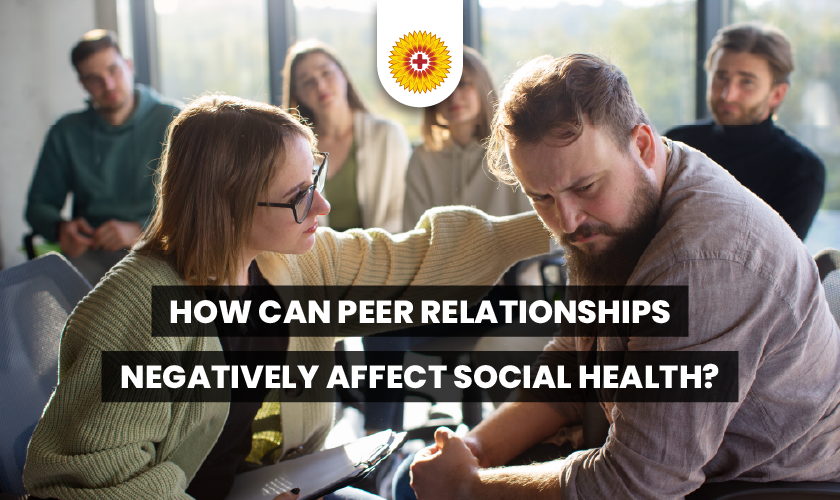Building relationships is an essential part of life.
Whether it’s with family, friends or your colleagues — these connections play a huge part in our general wellness.
Among these, peer relationships, or those with people in our age group or social circle, hold a lot of importance especially during our formative years.
Although it’s true that positive peer relationships can add to our social health but negative ones can have bad effects.
In this blog below, we’ll talk about how peer relationships can sometimes go awry and impact our social well-being.
What Are Peer Relationships?
Peer relationships definition: Peer relationships are the connections we share with people of our age, or background, or social status.
Basically, they start in childhood and adolescence and run on through adulthood.
Peer relationships examples:
- Friends.
- Classmates.
- Teammates.
- Coworkers.
- Online communities.
- Peer support groups.
The Importance and Benefits of Peer Relationships
Positive peer relationships are highly beneficial.
They offer emotional support, companionship, and a feeling of belonging.
Consolations by friends offering advice, encouragement and clarification on some issues.
And again, peer relationships also aid in our social development thereby helping us to learn how to communicate well as well as cooperate and empathize.
How Can Peer Relationships Negatively Affect Your Social Health
1. Bullying and harassment
At times there may be ties that bind peer relationships and bullying together.
Harassment is among the worst negative consequences of peer relations.
Being ridiculed constantly, intimidated or excluded by peers can lead to loneliness, low self-esteem and depression.
Peer pressure comes in various forms including physical assault, verbal insults or even cyberbullying which can impact one’s social health for life.
2. Peer pressure.
During these teenage years especially, peer pressure is another common issue in peer relationships.
The kind of choices that they may make due to their desire for conformity within certain groups or taking part in risky activities could jeopardize their social life.
For instance, consuming alcohol and drugs or engaging in any other irresponsible activity can lead to problematic relations with others and a damaged psyche.
3. Social comparison and jealousy.
The social health of a person can as well be affected by continuous self-comparison with peers and feeling jealous about their achievements or belongings.
This is made worse by the use of social media in this hyper-connected world where people often show edited versions of their lives that can cause feelings of inadequacy or exclusion among others.
And this, in turn, affects one’s ability to truly connect with other people through the sense of insecurity, envy and aloneness.
4. Conflict and betrayal.
While conflict is inevitable between two people relating to each other, unresolved conflicts or betrayals within peer relationships have far reaching effects.
In friendships trust is paramount and breaking it causes a sense of betrayal and resentment.
Actions like spreading rumours about somebody behind them, gossiping about somebody behind their back or even breaking confidences may erode friendship’s foundation and harm social health.
Coping Strategies
1. Getting support.
If you find yourself in a negative peer relationship, it’s essential to seek support from trusted adults, such as parents, teachers, or counselors.
Talking about your experiences can help ease feelings of isolation and provide guidance on how to address the situation.
2. Setting boundaries.
You must learn how to establish set boundaries for healthy peer relationships.
Be confident about your wants and principles, and do not be afraid to distance yourself from people who regularly exhibit negative behaviors.
3. Developing endurance and strength.
Building resilience can help mitigate the effects of bad peer relations.
Focus on cultivating self-esteem, developing interests apart from peers and having supportive friends that bring you up.
Conclusion
Negative peer relationships can ruin our social well-being.
These challenges include bullying, peer pressure, jealousy, conflicts among others hence compromising our wellness and preventing formation of meaningful relationships.
Knowing how to spot an unhealthy peer relationship in addition to implementing coping mechanisms would enhance a person’s social health.
If you’re struggling with negative peer relationships and need support and guidance for your mental well-being, reach out to Urgent Care of Kansas.
Our professionals can provide guidance and resources to help you prioritize your social wellness.
FAQs
How do I know when my peer relationships are negatively affecting my social health?
Signs of negative peer relationships include feeling isolated, poor self esteem anxiety and depression.
What should I do if I’m being bullied by my peers?
If you are a victim of bullying then get help from trusted adults and authorities.
Talk about what is happening with a teacher, school counselor or your parents.
What is a healthy peer relationship and how can I build it?
A healthy friendship entails such things as mutual respect, trustworthiness and support; it requires effective communication skills, empathy for one another and the ability to resolve conflicts.
Building healthier peer relationships starts with clear communication, mutual respect, and shared interests.
What are peer relationships in school?
Peer relationships in school refer to interactions and connections between students in an educational setting.
What are peer relationships at work?
Peer relationships in the workplace involve interactions and connections between colleagues in a professional environment.
What are peer relationship building activities?
Peer relationship building activities are exercises or games designed to foster positive interactions and connections among people.
How do peer relationships change in adolescence?
In adolescence, peer relationships usually become more influential as teens look for acceptance and identity within their social groups.
How peer relationships influence personal development?
Peer relationships can impact personal development by shaping social skills, self-esteem and emotional strength.
Negative peer relations have been linked to…?
Negative peer relations have been linked to issues such as loneliness, low self-esteem and mental health problems.



No comment